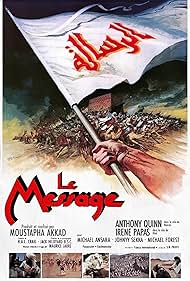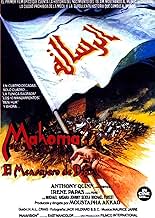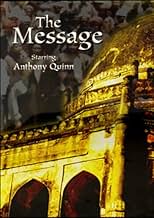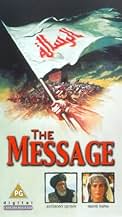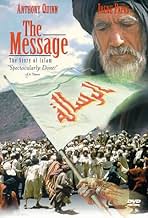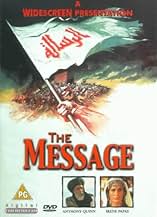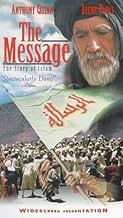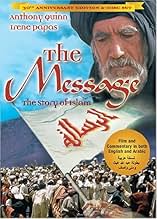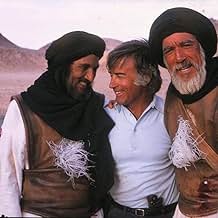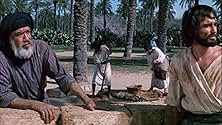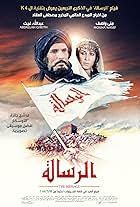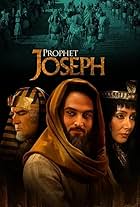Historical fresco recounting the life and times of the Prophet Mohammed, the last of the Abrahamic religion, in the sense that, according to Islam, he completed and sealed the monotheistic r... Read allHistorical fresco recounting the life and times of the Prophet Mohammed, the last of the Abrahamic religion, in the sense that, according to Islam, he completed and sealed the monotheistic revelation made to Abraham.Historical fresco recounting the life and times of the Prophet Mohammed, the last of the Abrahamic religion, in the sense that, according to Islam, he completed and sealed the monotheistic revelation made to Abraham.
- Nominated for 1 Oscar
- 1 nomination total
Nicholas Amer
- Suheil
- (as Nicolas Amer)
Storyline
Did you know
- TriviaThis film was made in both English and Arabic with two different casts, the lone exception being Andre Morell who is credited as Abu-Talib in both versions. Scenes were shot back to back in both languages.
- GoofsThere appears to be a hair on the lens in the right bottom of the frame during the shots where Hamza rides down a hill to find early followers tortured and killed.
- Alternate versionsDirector Moustafa Akkad wanted the story to be told in English, so people all around the world could enjoy it. Also, he felt he needed to pay a tribute to the Middle East, where it took place. So two versions were shot on location simultaneously. There were two actors for each role and the one that is well known now is the English Version, starring Anthony Quinn. However, "Al Risalah" (the Arabic movie) is the other well known version in Saudi Arabia and the surrounding countries.
- ConnectionsAlternate-language version of The Message (1976)
Featured review
This is a great film. I'm a history major who took several courses in the history of the Middle East and Islam, so nothing is going to be good or accurate or trivia filled enough for me, but it certainly didn't contradict anything I'd learned (for cinematic purposes or otherwise), and that's more than I can say for any historical epic I've seen in several years.
This film starts with Muhammed receiving the Koran from the angel Gabriel and ends at his death. It was filmed in accordance with Islamic political correctness, so The Prophet himself is never depicted, visually or vocally. While this is well affected, it unfortunately removes him from a lot of the story. I would like to have known a lot more about his life from the film, not his mannerisms or speech as depicted by a particular actor, but at least the major events of his life, his children, his wives, and so on.
Having said that, however, the film is still a very good depiction of the birth of Islam. The plot focuses on the historical events rather than the Koran itself, which contains almost no history from its own period, and is therefore different from a lot of Biblical epics which present the historical events IN the Bible. It's accurate in that it tries to present the birth of Islam as most people today probably learn it. Definitely not a propaganda piece, but it's not a movie filled with facts, truth or fiction, more a movie of character and tone. It's more similar to Braveheart than it is to Ben Hur or the Gospel of John. The movie presents a decent snapshot of the times and the attitudes and lifestyles under which Islam developed.
The acting is fantastic, the music is good (won an academy award), and the cinematography, filmed in Morocco and Libya, is beautiful. Costumes are cool, and there's a few scenes with a set of ancient bagpipes for you Celtic history buffs.
This film starts with Muhammed receiving the Koran from the angel Gabriel and ends at his death. It was filmed in accordance with Islamic political correctness, so The Prophet himself is never depicted, visually or vocally. While this is well affected, it unfortunately removes him from a lot of the story. I would like to have known a lot more about his life from the film, not his mannerisms or speech as depicted by a particular actor, but at least the major events of his life, his children, his wives, and so on.
Having said that, however, the film is still a very good depiction of the birth of Islam. The plot focuses on the historical events rather than the Koran itself, which contains almost no history from its own period, and is therefore different from a lot of Biblical epics which present the historical events IN the Bible. It's accurate in that it tries to present the birth of Islam as most people today probably learn it. Definitely not a propaganda piece, but it's not a movie filled with facts, truth or fiction, more a movie of character and tone. It's more similar to Braveheart than it is to Ben Hur or the Gospel of John. The movie presents a decent snapshot of the times and the attitudes and lifestyles under which Islam developed.
The acting is fantastic, the music is good (won an academy award), and the cinematography, filmed in Morocco and Libya, is beautiful. Costumes are cool, and there's a few scenes with a set of ancient bagpipes for you Celtic history buffs.
- ShimmySnail
- Dec 3, 2004
- Permalink
- How long is The Message?Powered by Alexa
Details
- Release date
- Countries of origin
- Languages
- Also known as
- Mohammad: Messenger of God
- Filming locations
- Morocco(Mecca and Medina exteriors)
- Production company
- See more company credits at IMDbPro
Box office
- Budget
- $10,000,000 (estimated)
Contribute to this page
Suggest an edit or add missing content

